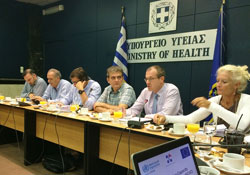WHO/Europe and Ministry of Health of Greece expand collaboration on health reform priorities

WHO
Greece, with support from the WHO Regional Office for Europe, has embarked on a two-year initiative as part of the country’s ongoing large-scale health sector reform. The second phase of the “Strengthening capacity for universal coverage” (SCUC2) project supports Greece’s move towards universal health coverage and will focus specifically on providing universal access to health services; establishing transparent, inclusive and modernized health governance; and ensuring fair and sustainable health financing.
In 2013, fewer than 80% of Greek citizens had health insurance coverage. Currently, out-of-pocket payments for health services in the country are high, a problem compounded by the fact that most of these payments are unregulated. Issues also persist in the quality of health services. In the face of these challenges, which have been further exacerbated by the country’s economic crisis, the government initiative builds on the cornerstone of reorganizing health care delivery around a modern primary health care system. It follows an earlier six-month first-phase project, also supported by WHO/Europe, to develop a framework for rolling out the primary health care network in the country.
The SCUC2 initiative was officially launched at the Ministry of Health in Athens on 21 September 2016. At the kick-off meeting, Minister of Health Dr Andreas Xanthos commented, “The health reform we have initiated is important in ensuring equitable access to services. We are committed to following the established schedule in developing sustainable, high-quality and equitable primary health care services for the entire population, and will do this irrespective of the availability of external resources.”
Key project priorities
The main priorities for the SCUC2 project are developing the primary health care network and addressing public health issues. The initiative will also assist in evaluating emergency health care services, optimizing the use of technologies, reducing out-of-pocket payments and improving central procurement mechanisms. It will continue to facilitate health policy dialogues with stakeholders.
In remarks given during the kick-off meeting, Dr Hans Kluge, Director of the Division of Health Systems and Public Health at the WHO Regional Office for Europe, said, “We are happy to extend our collaboration and hope to keep the same speed of interventions in order to move forward the ambitious reform agenda”.
Other participants at the launch event included Secretary General for Public Health Dr Giannis Baskozos, Deputy Secretary General for Primary Health Care Stamatis Vardaros, Chief of the Minister’s Cabinet Mr Panos Papadopoulos, other representatives of the Ministry of Health, members of the WHO Project Office in Athens and representatives of the Structural Reform Support Service (SRSS) of the European Commission.
All parties agreed to maintain and develop further the established coordination and communication mechanisms on both sides and to proceed immediately with detailed planning and implementation of activities.
The SCUC2 project is carried out with funding from the European Union through a grant agreement between the European Commission and WHO/Europe. Its general objective is to contribute to improving health and health equity in Greece, especially for the most vulnerable in the population, by helping the Greek authorities to move towards universal health coverage and to strengthen the effectiveness, efficiency and resilience of the health system.



